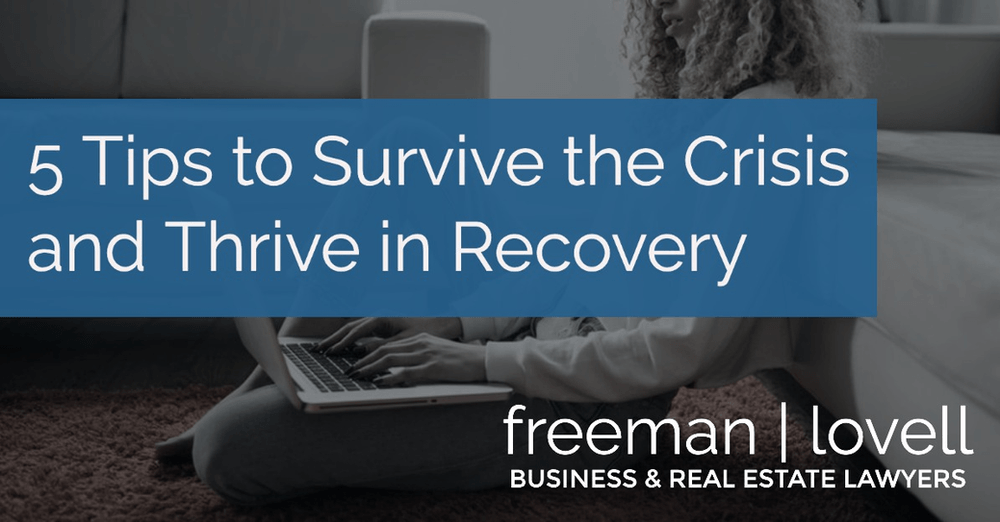
These are hard and scary times for entrepreneurs. Our margins are shrinking if not gone. How and where we work have been turned upside down. Our customers and almost all segments of the economy are shrinking. There are people everywhere suffering and losing loved ones.
The novel A Tale of Two Cities, by Charles Dickens, starts with the line: “It was the best of times, it was the worst of times, . . . it was the spring of hope, it was the winter of despair . . . .” Call me an optimist, but I think that this challenging and awful time also presents some wonderful consequences and opportunities.
We are spending more time with our families. We are reevaluating our lives, what it means to be alive and happy. We are finding new joy in the small and simple things in our lives. We better understand the strength of the human spirit and our collective will to sacrifice for others. We see that there is joy in sacrificing some things now for a better future.
Back to business. So what do we do now that the world has been turned upside down? The first and most necessary thing is to survive. Once we have secured our survival, then we can focus on positioning ourselves to thrive in the future to come.
LET’S SURVIVE
Get Lean and Sacrifice
The first step to survival is to get lean and make the right sacrifices.
Take the time to evaluate carefully who you are as a business and what are your essential functions. You will need to evaluate and judge between which business expenses are necessary, which are nice to have, and which are no more than bloat and fat, left over from a period of excess. You need to eliminate the bloat and fat quickly. Nice-to-haves probably also need to go. Only the essentials should survive.
Now is the time to cut the fat and keep the essential. Many companies are now in a position to renegotiate terms and rates to encourage economic growth and recovery as soon as possible.
You should also plan on adjusting your compensation plans to ensure all of your needed people can survive. The businesses that fire and lay off much of their lower-paid employees and contractors may survive, but they are going to have a tough time taking the next step of positioning the business to thrive through an economic recovery period. That is why many leaders have been reducing their and their senior people’s salaries and compensation packages first.
Profits First
The age of easy investment and being able to count on future investment rounds to fuel future growth is likely over for the foreseeable future. Angel and venture investors are likely going to shrink the size of their investments and use more of the dry powder that they have to support their current portfolio companies.
It will be crucial to find ways to become profitable earlier and extend out burn-rates as long as possible. There are many examples of bootstrapped companies in all industries. Studying up on those companies is a solid investment of an entrepreneur's time.
If you need cash to cover expenses, take advantage of the PPP and EIDL SBA loan programs. Get or increase your lines of credit and apply for whatever bank and other debt financing that you may be eligible for.
At the end of the day, in this economy, the companies that can scale back expenses and quickly get back to profitability will be those that will be able to survive and position themselves to thrive moving forward.
Be Lawsuit Ready
Entrepreneurs need to be aware that periods of economic recession and recovery are times of increased legal disputes and lawsuits . The two actions that we suggest our entrepreneur clients take are: (1) to evaluate, and enhance if necessary, commercial liability insurance policies; (2) evaluate your contracts and limit liability moving forward; and (3) ensure that your business is going to protect you personally from liabilities and lawsuits brought against your company.
The first step is as easy as giving a call to your insurance broker. Bring them up to speed on your business and discuss whether your insurance package is comprehensive enough in scope to cover the many areas of liabilities that you may face and large enough to cover the costs of liabilities and lawsuits that may be coming your way.
The next step we advise is to review your customer and other 3rd party facing legal agreements and contracts and review and/or implement provisions that cap or limit your overall liability under those contracts to make sure that if you do have an increased number of legal claims and lawsuits on those contracts that they will stay within insurance limits and not put your business resources at risk.
The final step is to review your business structure and the level of formality that you have been operating your business legally under and tighten up any areas that might expose you as an owner to being liable for business expenses. The areas where we see the most mistakes made are the following:
- If you are a corporation, not holding annual shareholder and board of director meetings.
- Not having written meeting minutes or written consents to formally approve corporate actions.
- Not keeping proper books and accounting and making unreimbursed personal expenditures on a company account.
- Not making annual filings and state registrations and allowing your business entity’s good standing status to lapse.
- If your entity is an LLC, not ensuring that your operating agreement doesn’t expose the owners to any personal liability for the debts or obligations of the company.
NOW TO THRIVE
Get Flexible and Diversify Product and Service Offerings
Successful and thriving businesses have multiple revenue streams that support and drive to the sales of the key products or offerings of your business.
Now is the time to explore how you make money. Here are some things to ask yourself and explore:
- Can you productize your service offering to sell a less-customized version of your service at a lower cost?
- Can you offer professional services to enhance the product or technology offering that you sell?
- Can you create an online course to teach your clients and potential customers about ways to receive your services at a lower cost per person model?
- Can you create a successful YouTube channel and make a revenue stream from advertising revenue?
- Can you promote and sell partner company services and products that support and enhance your services and products?
I’m not suggesting that you do everything, but that you are very strategic in how you link these different offerings together to strategically lead your clients to your most profitable products or services.
Play the Long Game
Look into the future regularly and make plans for how you see your company fitting into the future business landscape. Economic downturns and recessions are temporary. The key is to look far enough forward to see how the economic downturn is going to change the nature of your industry and business and start now to prepare your customers and clients to see you as a fearless leader in leading the industry into that new reality.
Build a strong foundation. In hard economic times, where there is more time and capacity, it is time to invest in your foundation. Invest in expanding your customer base and enhancing the loyalty of your customer base to you. Invest in your systems, processes, and core business activities to support the exponential growth to come with your expanded base when the economy starts heading back up.
Give back and support those on the front lines of the pandemic. Now is not the time for profiteering. Find ways to support your customers, your community, your family, and your friends. The better we all make it through this period, the quicker and stronger the recovery will be. Support your local food bank and homeless shelters. Be generous with your time, resources, and support the community who has supported you through the good times.
Let’s do what we can today so we can look back as a people at this time and say: “It was the best of times, . . . it was the spring of hope . . . .” We can get through this together!




